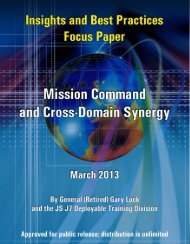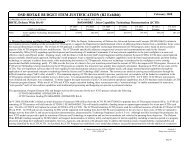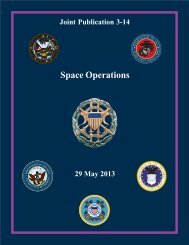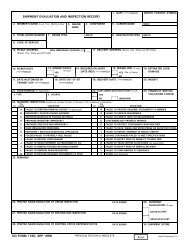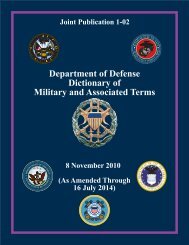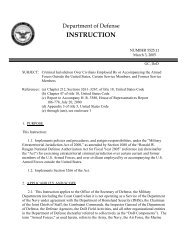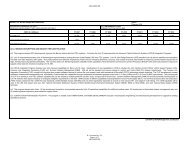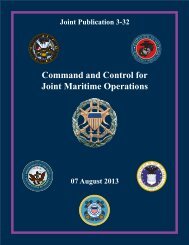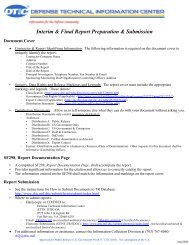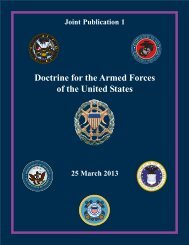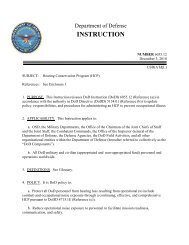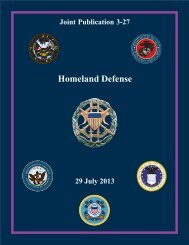JP 3-16, Multinational Operations - Defense Technical Information ...
JP 3-16, Multinational Operations - Defense Technical Information ...
JP 3-16, Multinational Operations - Defense Technical Information ...
Create successful ePaper yourself
Turn your PDF publications into a flip-book with our unique Google optimized e-Paper software.
Planning and Execution Considerations<br />
(3) Coordinate requests for augmentation to support recovery operations as<br />
required.<br />
d. PR operations may extend across national lines of responsibility. Operational<br />
flexibility, interoperability, and multisystem redundancy are the primary factors in successful<br />
PR operations. Commanders should know the PR capabilities available to maximize unified<br />
action, achieve economy of force, and enhance SA to enable those most capable of executing<br />
the five PR execution tasks: report, locate, support, recover, and reintegrate.<br />
See <strong>JP</strong> 3-50, Personnel Recovery, for information on how to organize a comprehensive<br />
joint/combined PR network.<br />
26. Host-Nation Support<br />
SECTION C. OTHER CONSIDERATIONS<br />
a. HNS will often be critical to the success of a multinational operation. In general,<br />
centralized coordination of HNS planning and execution will help ensure that HNS resources<br />
are allocated most effectively to support the MNF’s priorities. The more limited HNS<br />
resources are in the OA, the greater the requirement for centralized management.<br />
b. NATO doctrine recognizes the importance of centralized HNS coordination and<br />
gives NATO commanders the authority to:<br />
(1) Prioritize HNS requirements.<br />
(2) Negotiate HNS agreements, on behalf of nations, with an HN.<br />
(3) Coordinate HNS allocation with “sending” nations and an HN.<br />
c. In US-led multinational operations, nations typically negotiate their own HNS<br />
agreements. Nevertheless, participating nations should coordinate their HNS arrangements<br />
with the MNFC, who in turn should coordinate HNS allocation with the HN. The MNFC<br />
should involve participating nations in the negotiation of either commonly worded separate<br />
bilateral target audiences or a single agreement applicable to the entire MNTF.<br />
d. Host-Nation Support Coordination Cell (HNSCC). To assist the MNFC in HNS<br />
coordination activities, an HNSCC may be established. One of the most important functions<br />
of the HNSCC is to assist the MNFC and legal counsel in developing technical arrangements<br />
(TAs) that involve sustainment matters such as infrastructure, financial management,<br />
purchasing and operational contract support, engineering, environment, hazardous material<br />
storage, landing and port fees, medical operations and support, border customs, tariffs, and<br />
real estate.<br />
(1) Staffing. The HNSCC should be staffed with specialists familiar with<br />
developing and executing HNS agreements. In addition, consideration should be given to<br />
including representatives of the HN within the HNSCC to:<br />
III-43



